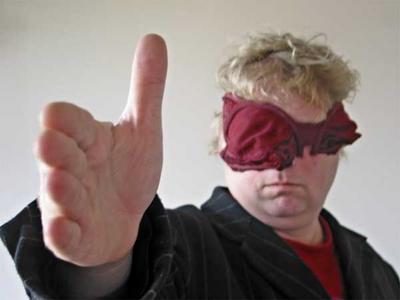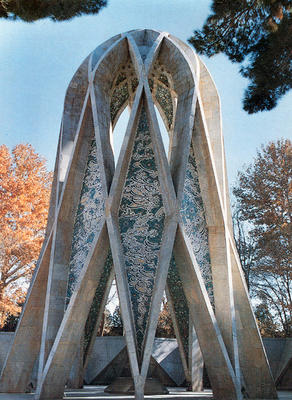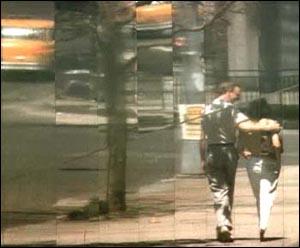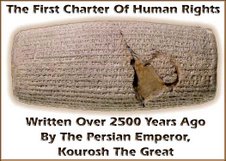[I]
In south Tehran there is a huge walled cemetery dedicated to the martyrs, the young men who died fighting in the 1979 revolution and the Iran-Iraq war of 1980-1988. This vast city of the dead, complete with its own subway station and shops, does not share Arlington National Cemetery's sublimely stoic aesthetic of identical tombstones, row upon row. In Tehran's war cemetery, each of the fallen is remembered individually with his own martyr's shrine, a sealed glass cabinet on a stand. The cabinets are filled with faded photos of men forever young, some in helmets or red bandannas, some carrying their weapons, others at home stroking the family cat or grinning during a meal with friends. Next to the yellowing photographs might be a Koran, or a faded copy of a Persian poem, or a set of plastic flowers, or one of the painted eggs that Iranian families exchange at their New Year. These little shrines seem to go on forever, each one a family's attempt to confer immortality on some young man who died in the trenches at a place like Khorramshahr, the pinnacle of Iranian resistance to the Iraqi invaders.
More than a million Iranians served in the war with Iraq. Three hundred thousand died and a larger number came home wounded. Although the conflict ended in stalemate and disillusion, it remains the Iranian revolution's defining moment of sacrifice. Accordingly, the regime still exploits the martyrs' sacrifices at every traffic roundabout in the country, with enormous posters of the bearded, unsmiling, very young men in uniform, heading off to battle and divine reward.
The religion of Iran, Shiite Islam, is a martyr's faith. Shiite culture has aspects of a death cult, including an obsession with blood sacrifice. For some surviving veterans, the camaraderie they experienced on the Iraqi front epitomized not only the patriotic virtues of the revolution but also the self-sacrificing virtues of their faith. Any American neoconservative betting on the Iranian regime to crumble under the impact of isolation, blockade, sanctions or foreign condemnation ought to pay a visit to the martyrs' cemetery. Revolutionary regimes anchored in faith and blood sacrifice have good reason to believe they are impervious to outside pressure.
I visited the cemetery of the martyrs late last month, during a trip to Iran to lecture on human rights, mostly to reform-minded students and intellectuals. My arrival fell between rounds of the country's presidential election. In the first round of voting, Mahmoud Ahmadinejad -- the son of an ironworker, a former Revolutionary Guard during the war with Iraq and, briefly, the appointed mayor of Tehran -- had come from nowhere to win about 20 percent of the vote. The former Iranian president Ali Akbar Hashemi Rafsanjani, the supposedly reformist candidate, was struggling to hold off Ahmadinejad's challenge in the second round. Ahmadinejad is an authoritarian populist with a base of support among the poor in the shantytowns and warrens of south Tehran. Unlike Rafsanjani, he is not a mullah, and he served in the war. This gave him access to the war veterans and the Basiji, the paramilitary popular militias created during the war, and he was using them to get out the vote in the poorest neighborhoods of south Tehran. He promised the poor justice, but most of all he promised the veterans rewards for their sacrifice. Immediately labeled a hard-liner by most American commentators, Ahmadinejad sent out more populist, inclusive signals at home, leading some Iranians to worry that quick American condemnations of him as a reactionary might only provoke him into becoming one.
At the beginning of the week that I arrived, there were few Ahmadinejad posters around Tehran for the presidential runoff. Thanks to the veterans, by the eve of the final vote, banners and posters were displayed everywhere. At night, cars would grind to a halt while Ahmadinejad supporters, with his picture plastered on their foreheads, danced around the traffic circles. In the end, Ahmadinejad easily defeated Rafsanjani in the runoff election, winning with about 60 percent of the vote. It was a victory so unexpected that some were already calling it the second Iranian revolution.
[II]
Ahmadinejad had capitalized not only on his war service but also on gathering disillusion with the failure of the reformers -- nominally in power since the election of President Mohammad Khatami in 1997 -- to address popular grievances relating to jobs, housing, transport and, above all, the growing class divide. In leafy north Tehran, reformers were talking about human rights and democracy, while in dusty south Tehran, the poor were struggling to hold onto jobs in an economy in which unemployment was officially 15 percent and probably twice that. For the reformers, the victory brought home how out of touch with ordinary Iranians many of them had become.
''That was our chief mistake,'' Amir Hossein Barmaki, a middle-class Tehrani who now works for the United Nations in the city, told me. ''The reformers -- Khatami and Rafsanjani -- came to power after the war and they did nothing for the veterans. These boys from the poor districts came home, having saved the country, and we did nothing for them. There were some who are dying of Saddam's poison gas attacks who didn't even get a pension.''
''No,'' he went on. ''There was worse. None of us actually went to the war. All the middle class went abroad or stayed in university. We sent the poor instead. We could even buy our way out of military service. It is our shame.''
On the nights after Ahmadinejad's victory, the atmosphere among many of the liberal Iranians I talked with was reminiscent of another group of intellectuals: the Russian thinkers of the 1860's, Western-educated men and women who had to discover, painfully, just how out of touch their reformist ideas were with the poor and burdened of their own society. Barmaki told me mournfully, ''We reformers have lost five years.''
The political task ahead for the liberal thinkers of Iran is to find a program that links human rights and democracy to the poor's economic grievances.
[III]
I had been invited to lecture on human rights and democracy, but Ahmadinejad's unexpected victory changed the agenda of my talks. Suddenly the question was no longer, What do democracy and human rights mean in an Islamic society? but, Can democracy and human rights make any headway at all in a society deeply divided between rich and poor, included and excluded, educated and uneducated? The reformers had promoted human rights and democracy as a panacea for Iran's poor, and what had been the result?

The slums of Tehran voted for a man who advocated stricter discipline for women, tougher theocratic rule and state control of the economy.
I was invited not by the mullah-dominated universities but by the Cultural Research Bureau, an independent center in Tehran that publishes books and runs its own gift shop, gallery and lecture hall. My Iranian host, Ramin Jahanbegloo, works in a tiny shared office at the bureau, inviting foreign guests and building up a small circle of free-minded students whom he lectures on European thought. He and I had never met, but he has published a book of conversations he had as a student with Isaiah Berlin, the Oxford philosopher of liberalism, and I have written a biography of Berlin. We are Berliners.
Berlin himself visited Tehran in the late 1970's, during the dying years of the shah's regime. He gave a lecture -- ''On the Rise of Cultural Pluralism'' -- in front of the empress, who, as Berlin later recounted, fidgeted irritably and then made a sign to a courtier to get Berlin to cut it short. In midlecture, Berlin sat down, he told a friend, ''as if stung by several wasps.'' All in all it was not a happy visit. The shah's Iran, he decided, was the last czarist regime on earth. Propped up by the Americans and kept in power by a hated secret police, the shah launched a White Revolution in the 1960's, a grandiose modernization program that alienated mullahs, merchants and students alike. Eventually, street demonstrations forced him to abdicate, and he fled into exile in 1979. After that came the Shiite revolution, led by Ayatollah Khomeini. Since then, hundreds of thousands of Iranians have gone into exile, and the liberal intelligentsia that remains is both cut off from the mass of the Iranian population and isolated from the Western universities from which it draws its inspiration.
Jahanbegloo says he thinks of himself as a bridge between Iran and those universities. He invites a steady stream of philosophers like Richard Rorty from Stanford and Agnes Heller from the New School in New York to give talks to students. He sees some signs that their ideas are finding a toehold in Tehran. Three decades ago, the intellectuels du jour were Michel Foucault and fellow radical theorists. They arrived in Tehran proclaiming their solidarity with a revolution that actively despised them while persecuting its own freethinkers. Now the pendulum in Tehran has swung toward pragmatic liberals like Berlin.
Upon arrival, I was immediately plunged into the kinds of discussions about democracy and freedom that took place in Prague, Warsaw and Budapest in the 1980's. On my first day, young journalists at a reform-minded newspaper called Shargh quizzed me about the difference between ''maximal'' and ''minimal'' democracy. Maximal democracy means elections plus rule of law, bills of rights and checks and balances. That is decades away in Iran. Minimal democracy is what they already have: guided rule by the mullahs that may deliver the country straight to tyranny under Ahmadinejad.
It became apparent that what I should have been teaching during my visit was the history of the Protestant Reformation. It's not just that Islam badly needs a Reformation. It's also that Iranians need to know how the Reformation and the bloody religious wars that followed it taught the West to put God in his place. Democracy arises, I told the students, not just to enthrone the people but also to separate religion and politics, establishing rules of tolerance that allow all religions to enjoy freedom and creating a political system in which religious and secular arguments compete on equal ground.
Many young Iranians I talked to were so hostile to clerical rule that I found myself cautioning them against going too far in the other direction. Many seemed in favor of a secular republicanism in which religion was excluded from politics altogether, as it was in Turkey during the rule of that country's modernizing dictator, Mustafa Kemal Ataturk. As Isaiah Berlin warned, however, if you bend the twig too far, it will snap back in your face. In Turkey, the reaction against the extremes of Ataturk's secularism has brought an Islamic government, though admittedly a moderate one, to power. Secularism, I argued, doesn't mean crushing religion, it just means creating a neutral space in which arguments between religious and secular people are settled by evidence, not dogma.
''Like in the United States?'' a bright female student asked me with a coy smile. In the United States, I said, God is never out of the public sphere. The furor over the end of Terri Schiavo's life and the Bush administration's restrictions on federal financing for stem cell research, among other things, make that obvious. From their vantage point inside a theocracy, young Iranians long for ''a wall of separation'' between religion and government, as Thomas Jefferson called it, and they told me they found it puzzling, even disappointing, that religion and politics are not actually separate in the United States. I tried to explain that keeping God in his place in a democracy is work that never ends.
Democracy in Iran also means working free of what one student called ''the culture of dictatorship,'' a floating web of patriarchal controls over private life. All of the young people I talked to were under 30, invariably were living at home till marriage and were chafing under restrictions on their personal lives. For young women, living free means the right to choose whom you marry and how much hair to display around your hijab; it means leaving to get an M.B.A. in Australia and then coming back and running a business. For one young man, struggling to find how he might buy his way out of compulsory military service, it means the freedom, he confessed in a whisper, to be gay. Homosexuality is a crime in Iran, and seemingly the only time when conversations do become furtive, with anxious looks over shoulders, is when homosexuality is the topic.
The hostility toward homosexuality is not just a reflex of a deeply traditional family culture. The Shiite regime has waged a 26-year war on pleasures both homosexual and heterosexual. In Persian culture, however, the taste for pleasure runs deep. Just think of the music-making, dancing and the costumed beauty of the men and women in classical Persian miniatures. During the revolution, many of these Persian treasures were hacked off the walls of mosques and palaces by Shiite zealots.
Thankfully, Persian pleasure remains stubbornly alive. When I flew south from Tehran to Isfahan, the astounding capital of the Safavid shahs of the 17th century, I spent one night wandering along the exquisitely lighted vaulted bridges, watching men, not necessarily gay, stroll hand in hand, singing to each other and dancing beneath the arches, while families picnicked on the grass by the banks of the river and men and women passed a water pipe around. Though it cannot be much comfort to those who have to live, here and now, under public and private tyrannies, I came away from a night in Isfahan believing that Persian pleasure, in the long run, would outlast Shiite puritanism.
[IV]
Like all revolutionary regimes, the Iranian state seems to have reproduced the ugliness of the regime it overthrew. The shah had a secret police -- Savak -- and the mullahs have one, too. One day in Tehran, on a street corner, I passed a small student demonstration linked to the elections and watched as a sweaty secret-police officer, with a gun in his waistband, tried to muscle a demonstrator away into a car. Other demonstrators started punching the officer, and he had to call for reinforcements. While he did so, the seized student wriggled free and disappeared into the crowd.
In a more genuinely fearful police state, he would have gone quietly. On the other hand, when this regime wants to crush the opposition, it does so with unflinching ruthlessness. Some religious minorities -- like the Armenian Christians -- are not persecuted, but others, like the Bahais -- a schismatic sect of Islam -- have been barred from the universities, and their leaders have been arrested, tortured and, in some cases, killed. Iranian human rights lawyers told me that they defend as many political prisoners as they can, but there are hundreds more held incommunicado. Some go into the prisons and never emerge alive. In June 2003, Zahra Kazemi, an Iranian holding a Canadian passport, was taking photographs outside the notorious Evin prison in Tehran when she was arrested and dragged inside. Three weeks later, the authorities announced that she had died under interrogation, and soon after that, evidence came out indicating that she had been tortured and raped. The Canadian government is demanding that those responsible be punished or dismissed, but a case in an Iranian court seems to be going nowhere.
Shirin Ebadi, the lawyer handling the Kazemi case and the regime's most visible opponent, is a heroic figure, a physically tiny dynamo, bursting with scorn for the regime and quick to shed her hijab in private houses as a sign of her independence. She walks a careful line, distancing herself from the Bush administration's criticism of the presidential elections, but remaining equally dismissive of the regime's claims that its guided democracy remains a democracy nonetheless. Having done time for political offenses herself, she knows the insides of the prisons where her clients now languish. The outgoing president, the supposed reformer Khatami, notably failed to lend Ebadi political cover and support when she came back from Oslo with the Nobel Peace Prize, the first ever Nobel given to an Iranian. When I asked her whether the prize and the recognition it brought protect her, she replied with a quizzical arch of an eyebrow: ''No, the Nobel does not protect me at all.''
[V]
At Shahid Beheshti University, I gave a seminar on human rights to a class composed mostly of young women in full-length black robes and head coverings. When I went up to shake their hands before the session started, they pulled their hands away. Such contact between the sexes is frowned upon. But in class, they were anything but docile. In often fluent English, they asked what I thought about Islamic Shariah law and its punishments, which can include stoning women to death for adultery. The challenge, I argued, is not understanding why these are wrong but prevailing politically against the religious authorities who believe that their own power depends on enforcing these penalties. The students replied that they needed help from Western intellectuals like me to get rid of Islamic punishments. I replied that while outside pressure can help, Western human rights advocacy can often have counterproductive results. In Nigeria, for example, an international letter-writing campaign organized by human rights advocates did not persuade an Islamic governor in northern Nigeria to halt the flogging of a teenage girl for having sex (she says she was raped) -- and the campaign might even have persuaded him to proceed, if reports are to be believed. On the other hand, a group of female Islamic lawyers worked within the Shariah system to defend another Nigerian woman who had been sentenced to stoning for adultery, securing her acquittal on a technicality (which drew criticism from some Western human rights advocates).

The women in the class were not happy with my suggestion that they should reform Shariah from within. ''There should be one law for everybody, not two systems, one of Islamic law and the other of secular law,'' one student argued. I agree, I said, but it's not obvious how you are going to get there in Iran. The students found this too defeatist. ''We are very glad that you come to our class, professor,'' one said to me, ''but you are too nice to the Shariah law. It must be abolished. It cannot be changed.''
One professor observing these exchanges was a middle-aged man in the light brown robes and white turban that designate a religious scholar. Having listened carefully, with his long legs stretched out beneath the desk, he asked me -- in fluent English -- why I thought human rights were universal. I gave the answer I use in my class at Harvard -- that if I were to go up to him, right now, and smack him across the face, anywhere in the world the act would count as an injustice and an insult. Human rights law codifies our agreement about stopping these intuitively obvious injustices.
But why, he pressed further, would an injustice against him also be perceived by me as an injustice? Because, I replied, human beings are not closed compartments. We can imagine what it would be like to be at the receiving end of the very blows we strike.
''You are an intuitionist,'' he said with a smile. I countered that the human capacity to understand the pain of others is a fact, not an intuition. ''But you need something stronger than this,'' he said. We continued for a while, agreeably disagreeing, but as he gathered up his papers to depart, he was smiling like someone who thought he had just won an argument. As far as he was concerned, beneath his belief in human rights lies the bedrock of the Koran, while beneath mine lies nothing but hopeful instincts.
[VI]
One day, I paid a call on Saeed Semnanian, the chancellor of one of Tehran's most conservative universities. We sat in his spartan office, while female engineering students walked to and fro in the gardens outside his window. I began with compliments about the achievements of the revolution. Female literacy has risen to 70 percent (though male literacy is still higher, at 84 percent), while income per head has doubled since the end of the war with Iraq. But, I went on, everyone I talked to in Tehran told me the revolution has congealed into a corrupt, repressive system of privileges that exploits Islamic orthodoxy to remain in power.
''Whom do you talk to?'' he asked me with a level stare.
''Intellectuals, writers, journalists.''
''You are trying to take the temperature of the revolution, but all your thermometers are wrong,'' he responded.
All this complaining, he implied, is what you would expect from discontented liberals. The achievement that matters, he said, is that Iran is independent. In the presidential elections, all the candidates were pure Iranian. In the shah's time, nothing was pure Iranian. Everything was decided in the American or the British Embassy.
He seemed faintly amused by my failure to understand his country. For him, the history of Iran is the history of attempts to subvert its independence. As far as he is concerned, it might be yesterday, and not in 1953, that Kermit Roosevelt and the C.I.A. organized the coup that overthrew Mohammed Mossadegh, the prime minister who nationalized the Iranian oil fields. The seizure of the American Embassy and the hostage drama were, as Semnanian saw it, an exquisitely drawn out revenge for the C.I.A.-inspired coup, just as the regime's current drive for nuclear weapons is a search for an ultimate guarantee of its freedom from foreign interference.
Iranian democrats contend that if Iran were a democracy, its nuclear weapons would not threaten anyone. What makes Iranian weapons dangerous, they argue, is that the regime is a theocracy with connections to Hamas and Hezbollah. A democratic Iran that broke with terrorism would be easier to live with, even if it possessed a nuclear bomb. As Shirin Ebadi told me, ''Who cares about France's force de frappe?''

American neoconservatives also tend to argue that democracy will make Iran peaceful and pro-American. This might be wishful thinking. Fear of encirclement by the United States means that the regime's drive for weapons has widespread popular support. If a genuine Iranian democracy were as nationalistic as most new democracies usually are, a democratic Iran might well remain a bellicose opponent of the United States and Israel.
In any event, America has almost no capacity to promote democracy inside Iran, and some capacity to do harm to Iranian democrats. Every Iranian I met wanted to spend time in the United States -- and wished there were more scholarships to take them to America -- but nearly every one of them laughed when I mentioned the recent Congressional appropriation of $3 million to support democratic opposition groups inside and outside the country. Iranian democrats look on American good intentions with incredulity. It would be fatal for any of them to accept American dollars. ''Do they want to get us all arrested as spies?'' one said to me.
Hence the paradox: the Middle Eastern Muslim society with the most pro-American democrats will strenuously resist any American attempt to promote democracy inside it. It is easy to understand why. ''We fought for our independence,'' Semnanian told me. ''You think when our people fought to drive out the invaders from Iraq for seven years, we were fighting only Saddam? We were fighting the U.S.A., Britain, the whole world. We saved our country. And now we are free.''
[VII]
The night before I left Tehran, I had a private conversation about Ahmadinejad's political program with one of the new president's advisers, A. Asgarkhani, a genial, long-haired professor in his 60's. When Asgarkhani, who holds a Western doctorate, first began predicting victory for his candidate a month ago, nobody believed him. Even a week before the runoff, nobody took him seriously. Now it had happened.

The good thing about Ahmadinejad's victory, Asgarkhani said, is that it will end the paralysis of the regime, the division between the reformers and the religious guardians who control the political system. All power will finally be in one set of hands. So the president can do something.
But won't that be bad for human rights? I asked.
Maybe at first, he replied, but then Ahmadinejad will bring human rights and democracy -- here he gestured with his hands -- ''from the top down.''
And how is Ahmadinejad going to change the economy? ''If he listens to me,'' Asgarkhani said, ''he is going to go with 'techno-nationalism.' ''
Techno-nationalism, import substitution, new growth theory -- all the catch phrases of Western development economics tumbled out of Asgarkhani's mouth, but they still sounded like the Islamic Marxism that has passed for economic theory in Iran since the revolution: don't depend on foreigners; keep the economy in state hands, otherwise foreign capitalists will get control of it; restrain the financial sector, because a free financial sector will cause the economy to melt down.

With oil at about $60 a barrel as I write, there is little likelihood that the regime will be forced to open up and reform the economy. But unless it does, there won't be much democracy or progress for the poor. One human rights truth, universally acknowledged, is that oil is an obstacle to democracy in every developing society. When a government can get what it needs out of oil derricks and ceases to derive its revenue from taxes, it loses any incentive to respond to the people. Theocracy in Iran is built on oil and will endure as long as the oil price holds up.
One young female Iranian economics major had told me wearily that she wondered why she bothered to study macroeconomics at all, since, in Iran, all economic decisions are made politically. The incoming president has promised the desperately poor the better life the revolution was supposed to deliver. What happens if all that the poor get are programs and policies like Asgarkhani's voodoo economics? Then all that will be left is the iron fist.

When I said this to another young Iranian woman and told her that when Ahmadinejad fails the poor, the only recourse left will be further repression, she said, determinedly: ''No, he cannot turn back the clock. He cannot send us backward.'' I hoped she was right, but I noticed that she made a small involuntary gesture. She pulled her hijab down and covered her hair entirely. For the first time, she looked uncertain and concerned.
Michael Ignatieff, a contributing writer, teaches about human rights at Harvard's Kennedy School of Government. He is the editor of ''American Exceptionalism and Human Rights,'' just published by Princeton University Press.













































